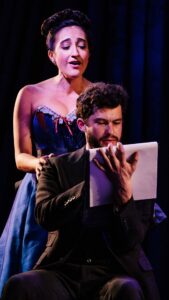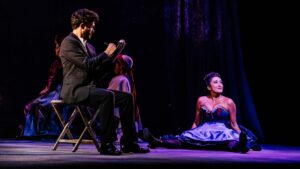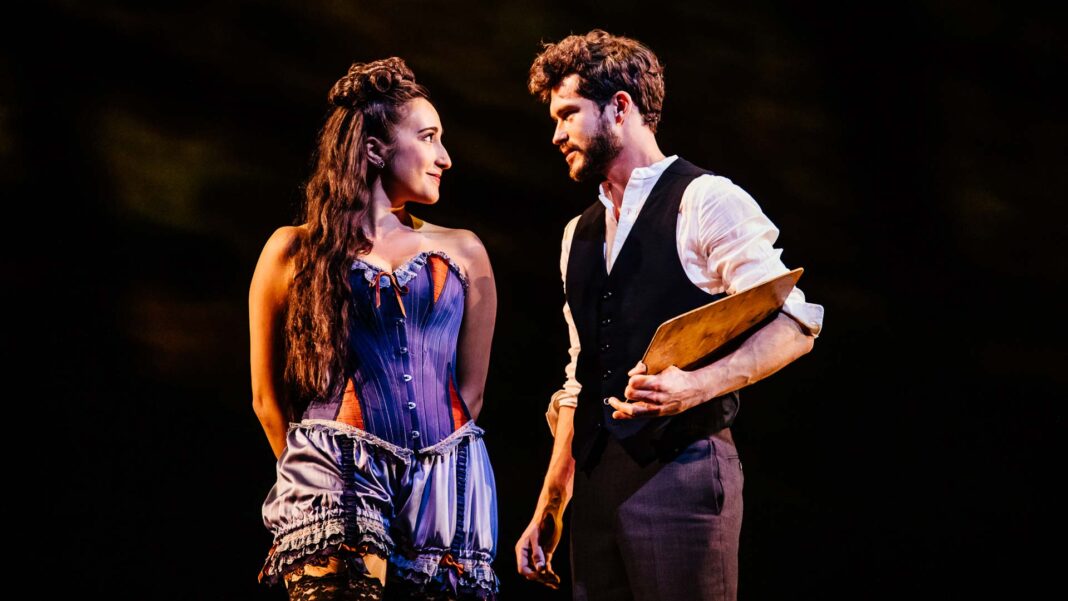The Stephen Sondheim and James Lapine musical Sunday in the Park with George was not a universally-praised musical when it opened on Broadway in May of 1984. It received mixed reviews and 10 Tony nominations. La Cage Aux Folles beat Sunday in most categories including Best Musical. But Sunday‘s reputation has grown immeasurably in the 39 years since it first opened. Which explains why a new production is now playing at the Pasadena Playhouse with Graham Phillips and Krystina Alabado in the roles originated by Mandy Patinkin and Bernadette Peters.
Both lead actors play two roles in the show. Act One depicts painter George Seurat’s intense mission to finish his masterpiece A Sunday Afternoon on the Island of La Grande Jatte. His muse and mistress is Dot. In Act Two, which takes place one hundred years later, a descendant of Seurat’s, also named George, is giving the world premiere of one of his works. Joining him for that premiere is his grandmother, Marie, who claims to be Seurat’s daughter and that her mother is the woman featured prominently at the front of his painting.
This is Alabado’s first time in a Sondheim musical. She’s appeared on Broadway in Mean Girls, American Idiot and American Psycho. On tour she’s also appeared in Spring Awakening and Evita.
Earlier this week I spoke via Zoom with Alabado about the dual roles she’s playing, specific lyrics of Sondheim’s found in the song Move On and about her experiences working with David Bowie on the musical Lazarus. What follows are excerpts from our conversation that have been edited for length and clarity. To see the full interview, please go to our YouTube channel.
As Dot you sing in Move On, “Anything you do, let it come from you. Then it will be new. Give us more to see.” How does playing this role allow you to see more of yourself as an actor and a singer?
This is my first time, in my 15 years of doing this professionally, of being able to tackle Sondheim. Which didn’t come out of not wanting to, but rather just the way that my career has gone. It just has never taken me in the path of Sondheim.
Also, I am a Mexican Lebanese woman. I think that, in the last five years maybe, this is the first time that we’ve seen different types being cast in these beautiful, huge Sondheim shows that possibly didn’t have that kind of accessibility for somebody like me in the past. So I feel very privileged and honored to be tackling this work.
I didn’t know Sunday in the Park very well. Every time I sing those lyrics in Move On I learn and find something new in them. I feel like I am changing as an actor, as a singer, as a performer with the incredible messages that Dot is trying to relay to George throughout the piece and the messages that Sondheim and James Lapine are trying to give us as the artists interpreting them. It’s been very moving for me.
When you’re tackling the work of Stephen Sondheim it’s obviously different than tackling Mean Girls. Not to belittle Mean Girls, but they don’t aspire to be the same thing at all.
What’s great about musical theater is we have so many different types of musicals. Sondheim is, as we all know, a complete genius in the art form – possibly the greatest musical theater composer creator that has and will ever have lived and touched all of us with his incredible work. I think tackling this is completely different than tackling Mean Girls.
I did American Idiot and Spring Awakening, all these different types of musicals. There is a density of this material that requires a different piece of you. You have to give yourself to it differently. Also, my brain has to activate in a certain way that takes a lot of focus as an actor as well. Not that I’m not focusing in those other shows, but this is a little bit of a different muscle.
I looked at an interview that your director, Sarna Lapine, gave to The Interval New York in 2017 when this production appeared on Broadway with Jake Gyllenhaal and Annaleigh Ashford. She was talking about the arc of the show as, “The mistress is the muse in Act One and she becomes the teacher in Act Two.” Did you and Sarna have any conversations about that way of looking at these two women that you’re playing?

Not in particular like that. But one of the things that we and Graham have always been in conversation about is what does Dot get from George? What does George learn from Dot? What does Marie teach George act two? What does George teach Marie in turn? How are all of these people still helping each other?
Dot and George have a harder time because they both want different things that Dot knows deep down she can never get from him and he can never get from her. [That’s] why it’s such a heartbreak what ends up happening for George and Dot. Me and Sarna had many conversations about the wisdom which Marie gives to second act George and where that comes from. It comes from the song Children and Art. It’s this idea that all we can do is learn the lessons from the people that we have passed, that have passed through us, that have come through us.
Do you think that her approach might be different as a woman and that she may have brought different resonance, different tones, different ways of depicting and telling this story?
Yes, absolutely. Sarna saw the original when she was eight years old. She talks about that. She talks about how deeply important this piece is to her, to her family, but really her personally.
What’s beautiful about reviving shows or trying them in different ways is that the show originally was interpreted so specifically by these two people that created it. The beautiful lesson that we all get to take when we revive or try shows again later on is that this gift was given to us, which is the original interpretation. [That] also involved Bernadette and Mandy. Everything about the original was crafted with this group of people so specifically. Then our job as interpretive artists is to find our way and new ways into it. How is the world different? How are we different? How do we interpret art differently? I can’t wait to see what Sunday in the Park with George interpreted in 2050 would be.
But as a woman with a woman director, which I don’t get to do very often either, we’ve had incredibly deep, wonderful conversations. Me, Sarna and Graham have really been so connected in this process. I think that Sarna, interpreting it through the eyes and lens of a woman, has given us wonderful new ways to see things and try things.
She’s given you new things to see. You get to do things in a new way. You’re living out what Sondheim wrote, aren’t you?
Right because that’s all we can do as artists.
I read an interview that Bernadette Peters gave thirty years after Sunday in the Park with George. She was talking about singing Move On and she said that it, “got to be like meditating. It was so healing and uplifting.” What do you experience when you get to that moment in the show?
The first couple of times we sang it I could not help but sob through it because it’s just cathartic. It’s oddly a release, but it’s a release in the most peaceful way, which is why the song to me is so incredible. The wisdom that is given to us in those lyrics, and that Dot gets to impart on George, is so moving. It’s what all of us desperately need to hear as actors, artists, creators. It’s, I agree, a meditation, a self-healing moment for me personally, for Dot or George, for Graham, for our company, for the audience. And it feels like this big moment of what we all need to hear right now. So I find it to be very healing in that way.
I do want to ask you about one new musical that you did, because I am a massive fan of another genius, a gentleman we used to have on this planet called David Bowie. What was the process like of working on Lazarus with, in and around David Bowie?
That’s a for a whole other hour of talking. But in short, it was one of the most unexpected, incredible things I’ve ever gotten to do in my life. When I was thinking I was going to do musical theater for a living, did I think I would get to work closely with a legend like that? The whole thing from start to finish was magical and zany and so unexpected and just so cool.
I started my career doing more rock musicals. So I was in that world. But then being able to find this with David and with the creators of Lazarus, with Ivo van Hove the director, what an opportunity and memories that I will never, ever lose because he was such a good person. And he loves musicals, which I didn’t really know about David until we were working on it. He was so grateful that we were all doing it. Everything he wanted was to write a musical and to have it performed. So it was just really important to him and, in turn, important to us.
We recorded the cast album on the day that he died. We didn’t know. It was a very interesting time. I hold it very dear to my heart in many, many ways.
I want to finish up our time by going one last time to Move On because it has my favorite lyric that I think has ever been written. “I chose and my world was shaken, so what. The choice may have been mistaken, the choosing was not.”
That’s my favorite lyric of the whole show.
Does that thinking play a part in how you move through your career, in your life, not only during Sunday in the Park with George, but for whatever else comes after that?

If anyone wants to know what it’s like to be an actor it’s that. Everything that we do feels like a little leap of faith. You never know what’s happening. I find that to be why my life is so rich and full of experiences and emotion. I could never be the person I am without having done this.
What we do is complicated. It can be very, very challenging, very hard. And it can also be really complicated to find levity in a business that sometimes can feel really difficult. I think that lesson in itself is why I love what I do so much. You do just have to choose. You have to take a leap.
You maybe made what could be interpreted as the wrong choice. But doing it is what was the right choice. All we can do is just keep going. I think that will always stay with me moving forward after this show, because that’s one of the hardest things I find as an actor is choosing and making choices and not being afraid of that. I think Dot is trying to teach us, and teach George in that moment, that just choosing and going forward is all we can do. We can’t know if it’s right or wrong, but all we can do is do it.
To see the full interview with Krystina Alabado, please go here.
Sunday in the Park with George continues at the Pasadena Playhouse through March 19th.
Main Photo: Krystina Alabado and Graham Phillips in Sunday in the Park with George (Photo by Jeff Lorch/Courtesy Pasadena Playhouse)











